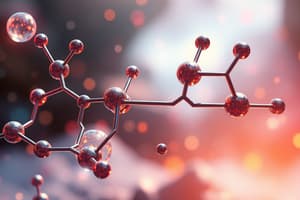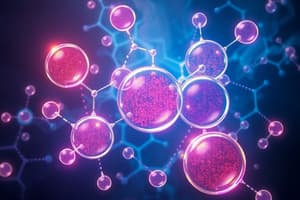Podcast
Questions and Answers
Which hydrocarbon category is composed of carbon rings fused in various ways?
Which hydrocarbon category is composed of carbon rings fused in various ways?
- Methane
- Alkanes
- Cyclohexane (correct)
- Pentane
What are the core components of hydrocarbons?
What are the core components of hydrocarbons?
- Carbon and oxygen atoms
- Carbon and helium atoms
- Carbon and nitrogen atoms
- Carbon and hydrogen atoms (correct)
What makes benzene unique compared to other hydrocarbons?
What makes benzene unique compared to other hydrocarbons?
- It has exceptional stability due to resonance and delocalized pi electrons (correct)
- It has linear chain structures
- It is highly reactive in nature
- It contains alternating single and triple bonds
How do alkanes like methane and pentane demonstrate their structures?
How do alkanes like methane and pentane demonstrate their structures?
What property contributes to the complexity of hydrocarbons?
What property contributes to the complexity of hydrocarbons?
What is the main reason for benzene's exceptional stability?
What is the main reason for benzene's exceptional stability?
What happens when hydrogen atoms in hydrocarbons are replaced with chlorine or bromine?
What happens when hydrogen atoms in hydrocarbons are replaced with chlorine or bromine?
Which modification of hydrocarbons results in the creation of alcohols?
Which modification of hydrocarbons results in the creation of alcohols?
What did Friedrich Kekulé discover about the ring structure of benzene?
What did Friedrich Kekulé discover about the ring structure of benzene?
What role do hydrocarbons primarily play in providing heat and energy?
What role do hydrocarbons primarily play in providing heat and energy?
In what way have recent advancements like flow chemistry impacted hydrocarbon transformation approaches?
In what way have recent advancements like flow chemistry impacted hydrocarbon transformation approaches?
What type of compounds can be derived from hydrocarbons through various modifications?
What type of compounds can be derived from hydrocarbons through various modifications?
Study Notes
Exploring Hydrocarbons within Organic Chemistry
In the diverse realm of chemistry, organically complex molecules hold particular fascination due to their unique characteristics and applications. Today, let's delve deeper into one specific class—hydrocarbons, the foundation stones of organic chemistry.
Hydrocarbons span a wide variety of structures and properties, all centering around their core components, carbon and hydrogen atoms bound together by strong covalent bonds. These simple molecules offer immense complexity when arranged in various configurations and connected through different types of bonds.
To appreciate this diversity, consider alkanes, such as methane and pentane; these chain-like structures demonstrate linear or branched arrangements of hydrocarbon chains, each carbon atom forming single covalent bonds with neighboring ones except for terminal carbons, which may have fewer attachments. Cyclohexane represents another category, composed of carbon rings fused in various ways, often resulting in multiple geometric isomers. A special mention must go to benzene, whose six-membered ring contains alternating single and double bonds, imparting exceptional stability owing to resonance and delocalized pi electrons.
This seemingly straightforward classification is significantly nuanced once we begin discussing substituents and functionalities. For instance, replacing hydrogen atoms with other functional groups, such as chlorine or bromine, yields halogenated hydrocarbons, while adding an oxygen atom creates alcohols. Further permutations lead us down paths towards ethers, aldehydes, ketones, esters, amines, and various classes of organometallic compounds. Each of these modifications brings forth fascinating insights into the reactivity patterns, stereoelectronic features, and synthetic potential of hydrocarbons.
As hydrocarbons encompass a vast spectrum of molecular complexity, so too does their myriad roles in chemistry and beyond. Natural gas, petroleum, coal, and crude oil derive primarily from fossil fuel deposits and consist largely of hydrocarbons. Their combustion provides us with heat and energy vital to modern society. Additionally, hydrocarbons serve as precursors in numerous chemical processes, feeding manufacturing lines across industries ranging from pharmaceuticals to plastics and rubber production.
Landmark achievements in hydrocarbon research, such as the groundbreaking work of Friedrich Kekulé uncovering the ring structure of benzene, have influenced subsequent developments in organic chemistry. More recent discoveries continue to pique curiosity regarding hydrocarbon synthesis and manipulation. For example, revolutionary advancements such as flow chemistry and the use of photocatalysts structurally simplify hydrocarbon transformation approaches. Meanwhile, novel techniques continue to emerge, allowing flexible modification of hydrocarbon scaffolds to accommodate emerging demands.
Through our exploration of hydrocarbons and their rich tapestry of possibilities, it becomes clear that the future holds exciting prospects and challenges alike, poised to inspire further innovation in the realm of organic chemistry, catalyzing progress and shaping tomorrow's technological landscape.
Studying That Suits You
Use AI to generate personalized quizzes and flashcards to suit your learning preferences.
Description
Dive into the world of hydrocarbons, the fundamental compounds in organic chemistry, and unravel their diverse structures, properties, and applications. Learn about the various types of hydrocarbons, including alkanes, cyclohexane, and benzene, as well as their roles in industries and landmark research findings.




